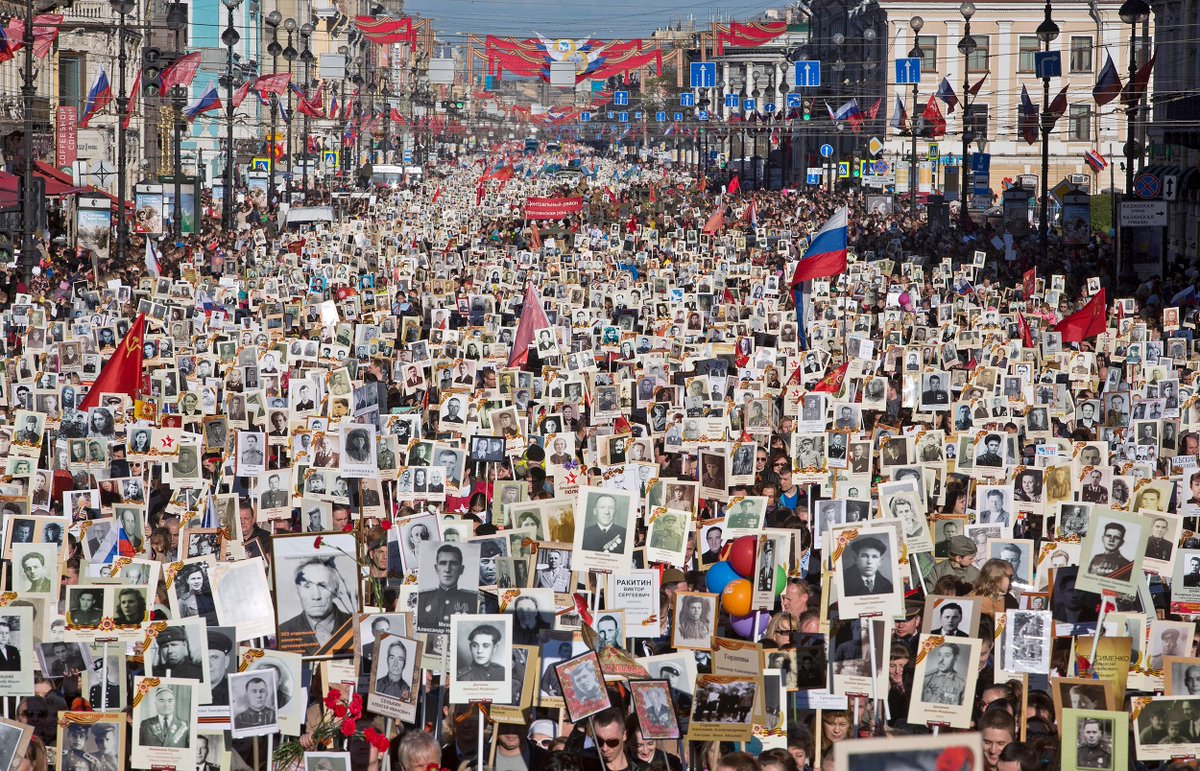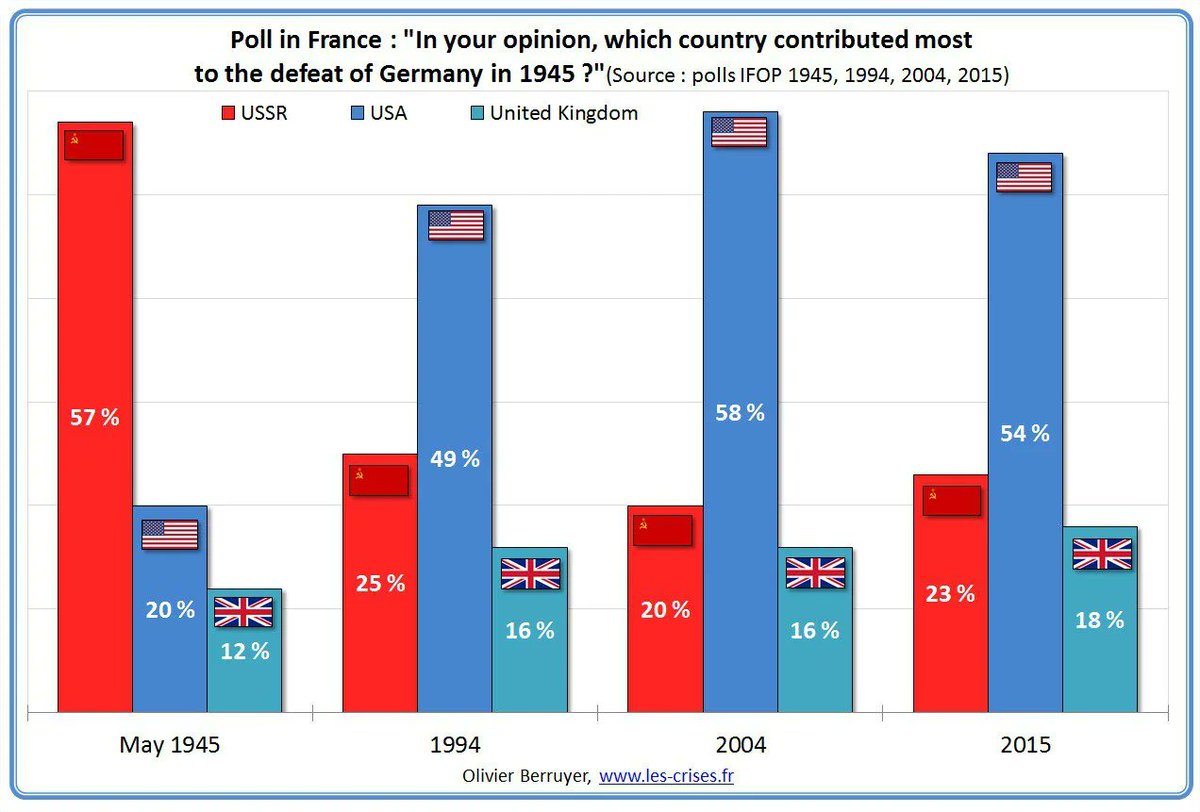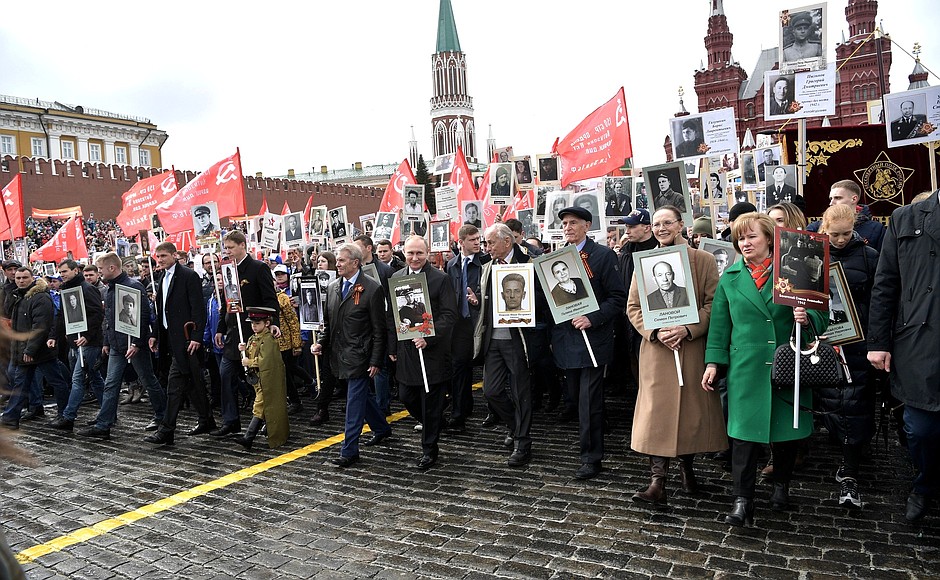
Each year on Victory Day — after a celebratory round of military parades, flybys, and speeches — the people of Russia take to the streets in one of the most profound and solemn expressions of historical remembrance I have ever witnessed: the Immortal Regiment. 

The streets are filled with the faces of lost relatives and comrades.
For a few hours, the partisans and soldiers, workers and resistance fighters, medical personnel and others who had lost their lives in the brutal war of resistance against Nazi barbarism are returned to life.
For a few hours, the partisans and soldiers, workers and resistance fighters, medical personnel and others who had lost their lives in the brutal war of resistance against Nazi barbarism are returned to life.
No country suffered as much as the Soviet Union in World War II — and no country played a bigger role in crushing the Nazi machine.
By the end of the war, some 25 million Soviet lives had been lost, including 25% of the population of Belarus.
By the end of the war, some 25 million Soviet lives had been lost, including 25% of the population of Belarus.
The Nazi intention was clear: to "annihilate" the Communists. "We are not waging a war to maintain our enemy," Hitler said. The policy was one of extermination: starve and gas the prisoners of war, enslave the people, rid the world of Communism for all eternity.
The Soviets knew that war was coming.
"Once again, as in 1914, the parties of bellicose imperialism, the parties of war and revanchism are coming to the foreground," Stalin said in 1934. "Quite clearly things are heading for a new war."
marxists.org/reference/arch…
"Once again, as in 1914, the parties of bellicose imperialism, the parties of war and revanchism are coming to the foreground," Stalin said in 1934. "Quite clearly things are heading for a new war."
marxists.org/reference/arch…
The Soviets tried to form an anti-fascist front, offering at one point to send a million troops to the German border to thwart Hitler.
Each time, they were rebuffed by Western powers, who maintained policies of accommodation and open trade with the Nazis.
telegraph.co.uk/news/worldnews…
Each time, they were rebuffed by Western powers, who maintained policies of accommodation and open trade with the Nazis.
telegraph.co.uk/news/worldnews…
Indeed, as the Soviets gathered to defend Czechoslovakia, the British and French met with the fascist powers in Munich to hand the Sudetenland to Hitler, cutting the Soviet Union out of the discussions.
en.wikipedia.org/wiki/Munich_Ag…
en.wikipedia.org/wiki/Munich_Ag…
The Nazis’ open hostility to Communism was seen as an asset.
In the late 1930s, Britain signed an agreement with Germany “to respect the German sphere of influence in Eastern and Southeastern Europe.”
In the late 1930s, Britain signed an agreement with Germany “to respect the German sphere of influence in Eastern and Southeastern Europe.”
The Nazis would avoid interfering with empire, and the British would abandon the east to destruction.
"[England] kept hoping against hope that she could embroil Russia and Germany with each other and thus escape scot-free," Harold Ickes, the US Secretary of the Interior, wrote.
"[England] kept hoping against hope that she could embroil Russia and Germany with each other and thus escape scot-free," Harold Ickes, the US Secretary of the Interior, wrote.
Even when the war started, before France or Britain had earnestly begun to resist the Nazi onslaught, plans were underway to send munitions to Finland — recognised as a strategic asset by Hitler — against the USSR, and to send an army to Baku to destroy the USSR’s oil fields.
In 1941, Hitler invaded Russia and the tables turned. What followed was some of the most brutal fighting in the history of warfare — and a remarkable victory, hailed by US General Douglas MacArthur "as the greatest military achievement in all history.”
nytimes.com/1942/02/23/arc…
nytimes.com/1942/02/23/arc…
That turn of rhetoric would prove hollow and short-lived. When the war was won, the alliance collapsed and Western powers quickly backtracked on a promise to pay the USSR reparations for its losses, instead launching firmly into a Cold War that would ultimately destroy it.
In 1945, when the Red Army stormed through Europe and hoisted its flag above Berlin’s Reichstag, the people of Europe knew who was to thank for their liberation. 57% of French people polled that year saw the USSR as having contributed most to Nazism’s defeat.
Today, thanks to decades of anti-Communist slander, that number has plummeted.
Attempts by neo-fascist factions in the EU to paint the war as a battle between “twin totalitarianisms” — a tool straight from the pre-war playbook — are a smear as grotesque as Holocaust Denial.
Attempts by neo-fascist factions in the EU to paint the war as a battle between “twin totalitarianisms” — a tool straight from the pre-war playbook — are a smear as grotesque as Holocaust Denial.

Why?
Because just as Holocaust Denial seeks to increase the prestige of the barbarians who committed open genocide, false equivalence between Nazism and Communism exculpates the political forces that, against the left, accommodated and supported Nazism as it rose to power.
Because just as Holocaust Denial seeks to increase the prestige of the barbarians who committed open genocide, false equivalence between Nazism and Communism exculpates the political forces that, against the left, accommodated and supported Nazism as it rose to power.
It is vital for us to understand this today, as the parties of the European establishment lurch rightward against “left-wing threats” — and make increasingly uncomfortable accommodations to European fascism once again. None of this is new.
The great lesson of the war is that fascism did not emerge from genocidal, barbaric, or evil intent. It emerged from the ashes of austerity, from technocracy, and from the fear that a European revolution would end the reign of empires, landlords, and monopolists on the continent.
And, if we are honour the memory of those who lost their lives to defend freedom, we must be able to defend against those same threats today. These do not arrive as death squads. They arrive as policies that put profit before people at all costs.
But if all that is difficult, think of the Immortal Regiment that marches through the streets of Russia today. These faces, who died by the millions for our freedom, deserve better than to be smeared in their afterlife. 

• • •
Missing some Tweet in this thread? You can try to
force a refresh




